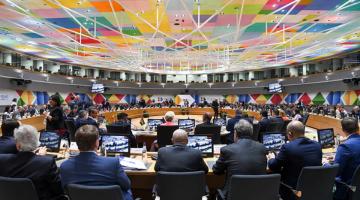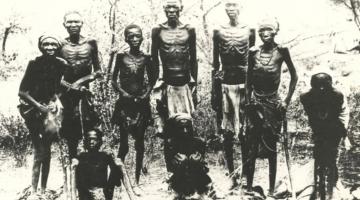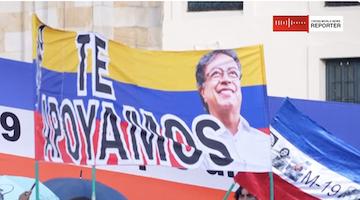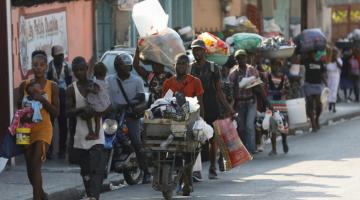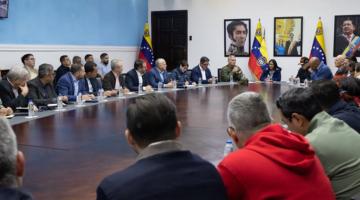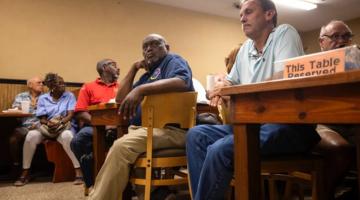Colombian Vice President Francia Márquez Mina is strengthening diplomatic relations with African countries and their connections with Colombia's African descended communities.
Colombia is the third country after Brazil and the United States with the largest Afro-descendant population in the Americas. With more than ten million people of African origins, cultures and practices rooted in Yoruba and Bantu philosophies, traditional languages such as the Palenquero, rhythms and even forms of self-identification that express roots with the continent, in Colombia it is still asked: why Africa?
In 2022, the government of President Gustavo Petro, a government for change, structured in the National Development Plan and foreign policy, the “Africa Strategy 2022-2026,” responded to Vice President Francia Márquez Mina’s initiative to pay more attention to the African continent and to develop concrete, meaningful relations with its countries.
Coming from a background as an organizer and political leader, defending collective rights of Afro-descendant people whose struggles to protect their ancestral lands from capitalist plunder and whose promotion of actions for the achievement of social and racial justice set a milestone on Black struggles in the region, Francia Marquez Mina understood the political importance and the need for momentum in closing historical and ideological gaps with the continent. She realized this need in a context of extreme polarizations and the need for solidarity, multilateral partnership and bold cooperation south-to-south, especially with countries that have been defying colonialism and paying the consequences for their stance.
For that reason, the Vice President took on her shoulders the responsibility assigned by the President of developing the Africa Strategy to generate paths of reunion with the continent. The Ministry of Foreign Affairs defined this purpose as aiming for an “unprecedented relationship."
In response to her mandate, Vice President Márquez Mina began a cycle of tours of African countries in May 2023, looking to identify the opportunities for this encounter and tracing routes that, within the framework of the objectives of the foreign policy and development plan, would open paths for: the expansion and strengthening of trade and investment; opportunities for academic mobility; internationalization of the artistic industry and artistic creation; cultural, academic, and scientific exchanges and research; strategic alliances that allow mobilizing the political interests of the country; and, especially, the development of a people-centered diplomacy that leads to the true reunion of the African Diaspora in Colombia with its African roots.
Colombia has maintained diplomatic relations with a number of African countries since the 1980s. Today, with five embassies and more than 38 countries with non-resident missions , the country has been present in parts of Africa without much visibility or relevance and, especially, without an understanding of the purpose by its own people.
The ordinary Colombian in general knows very little or nothing about the diplomatic activities of his country in the world. Much less does he know and understand what Colombia is doing in a continent with 54 sovereign states and 15% of the world's population, with significant economic growth and geopolitical influence, which he thinks of as if it were a single homogeneous and insignificant country.
On the other hand, despite the dramatic presence of Afro-descendant people in Colombia, the multi-ethnic and multicultural nation, declared as such in 1991 in its amended bill of rights, has an internalized reference of “blacks,” thanks to the impacts of colonialism and the racist ideology, that does not go beyond the history of enslavement.
That is why it is so incredible that the government organized high-level official trips to countries like South Africa, Mozambique, Madagascar, Kenya, Ethiopia, Ghana and Nigeria, which were led by a Black Vice president.
Derogatory, racist, and violent criticism quickly appeared and it is noisy, ill-founded, and grotesque. The critics have purposely ignored the arduous diplomatic and technical work involved in these working visits. Moreover, they prefer to ignore that, for more than thirty years, different governments prior to this government of change, installed embassies, appointed ambassadors and spent state resources without concern for any legacy. The indifference towards the continent has been so profound that even the State institutions themselves disregarded the policy of the Africa Strategy 2022-2026 in their portfolios, paying little attention to the possibilities of establishing direct and concrete relationships with their counterparts in Africa.
Fortunately, today something is changing, and apparently many Colombians are learning. It has taken three delegations with intense working meetings and the follow-up and diplomatic agendas of the embassies, to see transformations that are reflected in the prominent results of the recent visit made between August 25th and September 2nd in 2025 to Ethiopia, Mozambique, Madagascar and Nigeria. Supported by a large number of high-level institutions that provided concrete proposals and determination to make them effective, the governments visited were shown the true meaning of what President Petro enunciated during his inauguration speech as one of the priorities of his government: the reunion with Africa based on deepening and concretizing trade, cooperation, exchange and strategic alliances with members of the African Union which also represent themselves as a block in the critical decisions of the global politics.
For this reason, the decision to visit these countries and the messages of the official delegation were not arbitrary. Ethiopia is home to the headquarters of the African Union (AU). This year AU is working under the theme, "Justice for Africans and African descent through reparations" and it has a focus on strategizing for regional economic articulation and growth, as well as global political positioning integrating the Latin America and Caribbean countries as the Sixth Region of Africa. There, the high-level Colombian delegation presented initiatives on historical reparations, proposals to deepen interregional dialogues and South-South Cooperation, and the interest to learn from the AU on its mechanisms and processes of articulation and integration. These are key for Colombia which is now presiding over the Community of Latin America and the Caribbean States (CELAC).
For its part, Madagascar chairs the Economic Community of the Southern African Region (SADC), of which Mozambique is a member, and Nigeria is one of the countries with the strongest economies on the continent. In these countries, strategic alliances and the interests on trade, investment, environmental justice, build-up of regional unity that Colombia seeks during the presidency of CELAC and COP16 were discussed.
Assuming implementing a strategy for Africa is no small task. However, with her characteristic determination, Vice President Márquez Mina, rose above all cynicism, indifference and many contradictions at the institutional level, in leaving a footprint for the government of change. A visionary flagship path is showing the importance of articulating government, companies and civil society to work hand in hand, combining will, resources and capacities to make policies and programs feasible. It is a path that shows how to advance diplomatic relations between peers, recognizing mutual challenges and opportunities; valuing transparency, respect, solidarity and a sense of community that relations between developing countries in the global south need. This strategy defines in a practical way both a policy of public diplomacy and also between people of a country that works to position its global leadership.
The high-level visits made by the Vice President are milestones in foreign policy and diplomacy, particularly with Africa. It has been the first time that countries such as Mozambique and Madagascar, and even the iconic South Africa, have prominent Colombian institutional figures at home, sitting at the table to establish cooperation agreements for common benefit purposes. For the first time in the history of diplomatic relations with sub-Saharan African countries, companies from various sectors such as agrobusiness, food, textiles, biochemicals and services explore trade and investment opportunities with the African countries. For the first time, Colombian companies will reach the entrepreneurs and markets of African countries hand in hand with the national government under a policy of economic diplomacy. Likewise, it is the first time that women entrepreneurs are prioritized not only with strengthening programs but also with opportunities to establish relationships with peers in the continent.
These efforts of the Africa Strategy are not only from Colombia to Africa, they are also domestic. Programs such as "She Exports to Africa" under the Vice Presidency; exchange programs on peace and reconciliation; educational, science and technology programs of the Ministries developed with a focus on connection with Africa; cultural programs of the Ministry of Foreign Affairs that have provided opportunities for young people and artistic groups to exchange with groups and artists in the continent; agreements and memorandums of understanding such as those achieved during the first visit in 2023 to promote the internationalization of the art industry, academic and scientific exchange, the formation of university networks, among many others, are achievements that are providing a milestone of opportunities for people, groups, institutions, and organizations in Colombia.
All of these achievements are due to the vision that the Vice President imprinted on her assigned task, the determination and commitment with which she is characterized and the institutional understanding and support that finally the Africa Strategy is receiving.
Colombia is today a tangible presence in Africa, as it is in the other continents. The course of an unprecedented reunion among its peoples and governments is a navigable map thanks to that vision.
Nevertheless, it is still imperative to have a careful program of work for political and communicative pedagogy for a change that sincerely embraces Africa and its Diaspora in Colombia; a pedagogy that continues to elevate people's knowledge and understanding of the State, its relations with power and the exercise of power from the people to the highest levels of government This is a pedagogy that humanizes and restores compassion, generosity, respect and transformative determination, until dignity becomes customary.
In this government of progressivism and change, a woman, from the Afro-descendant diaspora, coming from the womb of ancestral territories and revolutionary processes against the injustices of the modern racist patriarchal capitalist world, challenged with her audacity all social paradigms and Colombian politics, tracing routes and forging transformations that, when we become ready as people, community and nation, will lead us to the change ambitioned for so long and intended with the popular vote in 2022.
When will we assume our own responsibility with the same determination as Francia Márquez Mina has done? We shouldn't be asking questions but acting with the same determination that she has shown as an example. There must be effective commitment to work to ensure that the changes we seek are realized.
Charo Mina-Rojas is an Afro-Colombian decolonial feminist and activist.

